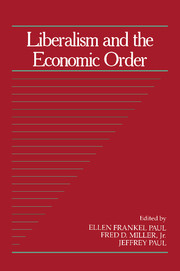Book contents
- Frontmatter
- Contents
- Introduction
- Acknowledgments
- Contributors
- The Social Market Economy
- From Post-Communism to Civil Society: The Reemergence of History and the Decline of the Western Model
- Asymmetrical Reciprocity in Market Exchange: Implications for Economies in Transition
- Institutions, Nationalism, and the Transition Process in Eastern Europe
- The Economic and Political Liberalization of Socialism: The Fundamental Problem of Property Rights
- Democracy, Markets, and the Legal Order: Notes on the Nature of Politics in a Radically Liberal Society
- Liberalism: Political and Economic
- Socialism as the Extension of Democracy
- Liberalism, Welfare Economics, and Freedom
- Some Rules of Constitutional Design
- The Morality of Inclusion
- A New Contractarian View of Tax and Regulatory Policy in the Emerging Market Economies
- Associations and Democracy
- Index
Introduction
Published online by Cambridge University Press: 05 October 2010
- Frontmatter
- Contents
- Introduction
- Acknowledgments
- Contributors
- The Social Market Economy
- From Post-Communism to Civil Society: The Reemergence of History and the Decline of the Western Model
- Asymmetrical Reciprocity in Market Exchange: Implications for Economies in Transition
- Institutions, Nationalism, and the Transition Process in Eastern Europe
- The Economic and Political Liberalization of Socialism: The Fundamental Problem of Property Rights
- Democracy, Markets, and the Legal Order: Notes on the Nature of Politics in a Radically Liberal Society
- Liberalism: Political and Economic
- Socialism as the Extension of Democracy
- Liberalism, Welfare Economics, and Freedom
- Some Rules of Constitutional Design
- The Morality of Inclusion
- A New Contractarian View of Tax and Regulatory Policy in the Emerging Market Economies
- Associations and Democracy
- Index
Summary
The fall of Communism, and the economic devastation that system bequeathed, leave the people of Eastern Europe and the former Soviet Union facing an uncertain economic future. The collapse of the totalitarian order means that many countries of the region must deal with political instability as well. The breakdown of order has aroused old enmities and has given rein to ethnic conflicts of the sort currently raging in Bosnia and in many of the former Soviet republics.
The antidote widely prescribed for the ills of the region is liberalism, conceived as democratic politics and free-market economics. It is assumed that the East should solve its problems by emulating the West. Yet the West is not monolithic; there are a number of models available to reformers in the East. It may be that no single political-economic system can succeed in bringing stability and prosperity to all the formerly Communist countries. As reformers in each country pursue their own solutions, they must take into account their people's distinctive history and cultural traditions.
To understand the process of transition as it unfolds, we must answer a number of questions. What are the attitudes of Easterners toward capitalism, and how can these be modified? What institutional obstacles exist to reform, and which of the institutional remnants of the old order must be changed or discarded if reform is to proceed? What new institutions must be introduced? More broadly, what model should reformers follow in making the transition to new political and economic systems? Is democratic capitalism the system they should embrace, or does that system have its own flaws and inconsistencies?
- Type
- Chapter
- Information
- Liberalism and the Economic Order , pp. vii - xvPublisher: Cambridge University PressPrint publication year: 1993



